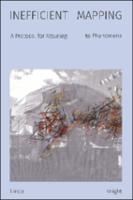Inefficient Mapping
A Protocol for Attuning to Phenomena
Author(s)
Knight, Linda
Collection
ScholarLedLanguage
EnglishAbstract
"Working from a speculative, more-than-human ontological position, Inefficient Mapping: A Protocol for Attuning to Phenomena presents a new, experimental cartographic practice and non-representational methodological protocol that attunes to the subaltern genealogies of sites and places, proposing a wayfaring practice for traversing the land founded on an ethics of care. As a methodological protocol, inefficient mapping inscribes the histories and politics of a place by gesturally marking affective and relational imprints of colonisation, industrialisation, appropriation, histories, futures, exclusions, privileges, neglect, survival, and persistence.
Inefficient Mapping details a research experiment and is designed to be taken out on mapping expeditions to be referred to, consulted with, and experimented with by those who are familiar or new to mapping. The inefficient mapping protocol described in this book is informed by feminist speculative and immanent theories, including posthuman theories, critical-cultural theories, Indigenous and critical place inquiry, as well as the works of Karen Barad, Erin Manning, Jane Bennett, Maria Puig de la Bellacassa, Elizabeth Povinelli, and Eve Tuck and Marcia McKenzie, which frame how inefficient mapping attunes to the matter, tenses, and ontologies of phenomena and how the interweaving agglomerations of theory, critique, and practice can remain embedded in experimental methodologies."
Keywords
art practice, cartography, chaosgraphs, ethical wayfinding, experimental methodologies, infographics, non-representational methodsDOI
10.53288/0336.1.00ISBN
9781953035745, 9781953035752Publisher
punctum booksPublisher website
https://punctumbooks.com/Publication date and place
Brooklyn, NY, 2021Imprint
Advanced MethodsClassification
Performance art
Theory of art


 Download
Download